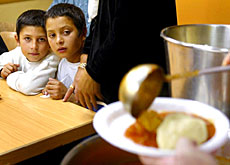Swiss migration plan has UN backing

Switzerland is pushing for an international agreement on migration, and is seeking to persuade other countries to sign up.
The “Bern Initiative” aims to come up with concrete guidelines for dealing with migration and has the approval of the United Nations.
According to the UN, global migration has more than doubled since 1975 – 175 million people now reside in a country other than the one of their birth.
Three quarters of these were migrants and one quarter were either refugees or displaced people.
Migration has especially affected Switzerland, where foreigners make up almost 20 per cent of the population, and the number of applications for asylum increased by over 26 per cent last year.
Last November, Swiss voters narrowly rejected a proposal to tighten the country’s asylum laws.
The Bern Initiative, which has been developed by the Federal Refugee Office, aims to bring the issue of migration to international attention.
G8 summit
Switzerland would like to see the initiative serve as a basis for an international commission on migration.
During talks with justice minister, Ruth Metzler, before the recent G8 summit at the French town of Evian, UN secretary general, Kofi Annan, declared his support for the plan. But Annan doesn’t want to launch the project himself.
The justice minister also took the opportunity to talk to both Nigerian and Senegalese leaders before the G8 summit and to agree to strengthen the migration dialogue between them.
This follows on from Senegal’s rejection of an asylum deal with Switzerland in March. Under the terms of that agreement – the first of its kind – Switzerland would have been able to deport West African asylum seekers to holding centres in Senegal while their applications were being processed.
The Bern Initiative was born two years ago, after the head of the Federal Refugee Office, Jean-Daniel Gerber, invited experts from several countries to an international meeting on the subject.
Not legally binding
According to Metzler, the guidelines are not supposed to be legally binding, but are intended to help governments implement a comprehensive and cohesive regional and global migration policy.
For the Swiss, the initiative represents an attempt to address migration on an international level. At present, the only global treaty dealing with the movement of people is the 1951 UN Convention relating to the Status of Refugees.
“Migration is becoming more and more of a long-running topic – in the UN and in the European Union,” Gerber told swissinfo.
Transit nations
Gerber says that the problem of migration cannot be solved unilaterally but must be tackled with the help of all the countries involved in the process – including the countries of origin and transit nations.
“We are arranging a seminar in July for 60 people from governments, NGOs [non-governmental organisations] such as the European Council of Refugees and Exiles, and experts. We have predominantly invited representatives from southern countries,” said Gerber.
Gerber says that the key aim of the Bern Initiative is to facilitate dialogue and it hopes to present the plan in the form of guidelines or a declaration by next year.
“We are currently in talks on a diplomatic level about migration policy with the UN and countries such as Sweden,” explained Gerber.
But political support for the initiative within the country remains lukewarm.
swissinfo, Elvira Wiegers (translation: Isobel Johnson)
Nearly 20% of the Swiss population is foreign.
Asylum applications went up by almost 27% last year.
Last November, Swiss voters narrowly threw out a rightwing proposal to dramatically tighten the asylum laws.
The UN says global migration has more than doubled since 1975 to 175 million.

In compliance with the JTI standards
More: SWI swissinfo.ch certified by the Journalism Trust Initiative










You can find an overview of ongoing debates with our journalists here . Please join us!
If you want to start a conversation about a topic raised in this article or want to report factual errors, email us at english@swissinfo.ch.